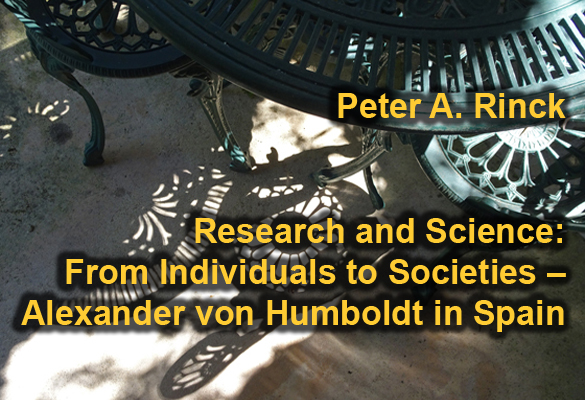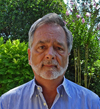


The Guest of the winter season 2019/2020 tells of Alexander von Humboldt's visit to Spain on his way to South America from autumn 1798 until June 1799. It's a small contribution to the 250th birthday of the great Prussian polymath.
What are Science and Scientists? Humboldt's final masterpiece was Cosmos, a monumental scientific project. The first volume appeared in 1845, when he was 76. Additional volumes came out every few years. Volume five was half finished at his death in 1859. “Cosmos” was a unification of all natural and human phenomena backed up by detailed factual observations.
Science is knowledge of the world of nature — the concerted human effort to understand, or to understand better, the history of the natural world and how it behaves and functions, with observable physical evidence as the basis of that understanding. It is done through observation of natural phenomena and through experimentation that tries to simulate natural processes under controlled conditions.
What is not considered science? Peter A. Rinck tries to give some explanations and answers — but there are other opinions, because today everybody wants to be a scientist, from software programmers to politologists.

 eter A. Rinck is a University Professor of Medical Imaging and has a Doctorate in History of Medicine (Medical Climatology).
eter A. Rinck is a University Professor of Medical Imaging and has a Doctorate in History of Medicine (Medical Climatology).
After a classical school education he attended medical school in Berlin (Free University of Berlin) and served his internship and residency in radiology, nuclear medicine and radiation therapy at Charlottenburg University Hospital in Berlin. Afterwards, until 1983, he was involved in the very early development of magnetic resonance imaging at the State University of New York at Stony Brook where he worked in Paul C. Lauterbur's research group (Nobel Prize in Medicine 2003).
Between 1987 and 1994 he was head of Europe's biggest clinical and research MR facility — at that time — at the University of Trondheim, Norway. Between 1986 and 2012 he was also Adjunct Professor at the School of Medicine and Pharmacy of the University of Mons-Hainaut in Belgium.
Since 1982 Rinck is Chairman of the European Magnetic Resonance Forum, EMRF, and since 2008 President of the Council of The Round Table Foundation, TRTF. He is also Chairman of the Selection Committees of the the Pro Academia Prize and of the European Magnetic Resonance Award. He has received fellowships, awards and prizes from numerous institutions, among others from the German Alexander von Humboldt Foundation.
His contribution is a Small Café presentation of a talk about Alexander von Humboldt's stay in Spain on his way to South America from the autumn of 1798 until late spring of 1799 and development of science in Spain.
| |
|
Peter A. Rinck: Research and Science: From Individuals to Societies — Alexander von Humboldt in Spain
|
|
Contents
Presentation |